- The mission of Cerro Coso Community College is to provide high quality degree and certificate curricula in lower division arts and sciences and in vocational/ technical/ occupational education. Essential to this mission is providing support services which enhance student opportunities for success. As part of this mission, the college will respond to the interests, aspirations, and capabilities of students while encouraging them to develop as useful, contributing members of society.
School Highlights
Cerro Coso Community College serves 8,063 students (11% of students are full-time).
The college's student:teacher ratio of 42:1 is higher than the state community college average of 32:1.
Minority enrollment is 67% of the student body (majority Hispanic), which is less than the state average of 77%.
Quick Stats (2025)
- Enrollment: 8,063 students
- In-state tuition: $1,290
- Out-state tuition: $7,086
- Student:teacher ratio: 42:1
- Minority enrollment: 67%
- Source: Integrated Postsecondary Education Data System (IPEDS)
School Overview
The teacher population of 192 teachers has stayed relatively flat over five years.
Cerro Coso Community College
(CA) Community College Avg.
Carnegie Classification
Associate's Colleges: High Transfer-High Nontraditional
Baccalaureate/Associate's Colleges: Associate's Dominant
Institution Level
At least 2 but less than 4 years
At least 2 but less than 4 years
Institution Control
Public
Public
Total Faculty
192 staff
294 staff
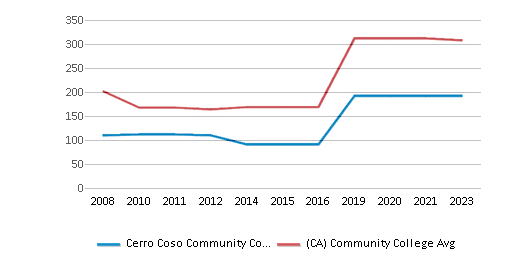
School Calendar
Student Body
The student population of Cerro Coso Community College has grown by 43% over five years.
The student:teacher ratio of 42:1 has increased from 27:1 over five years.
The Cerro Coso Community College diversity score of 0.66 is less than the state average of 0.70. The school's diversity has stayed relatively flat over five years.
Total Enrollment
8,063 students
2,311 students
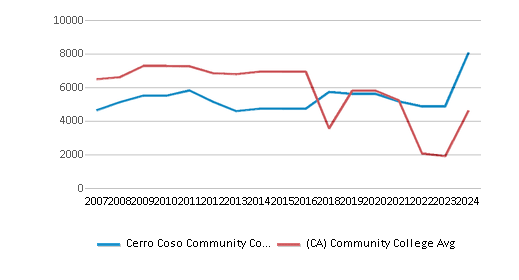
Student : Teacher Ratio
42:1
32:1
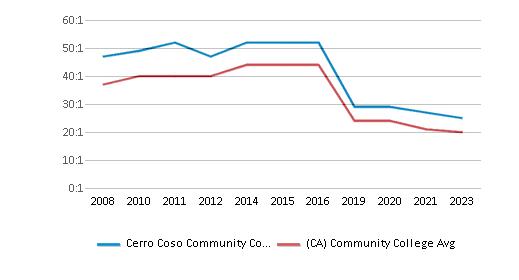
# Full-Time Students
915 students
1,232 students
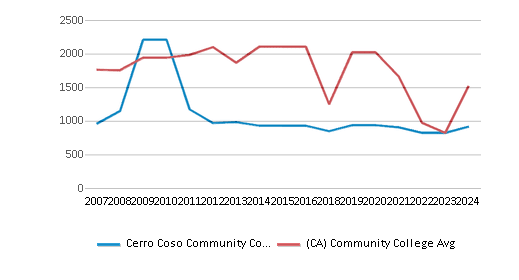
# Part-Time Students
7,148 students
8,299 students
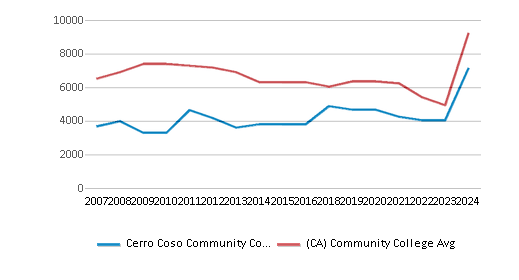
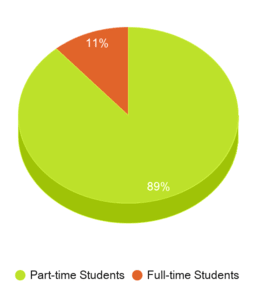
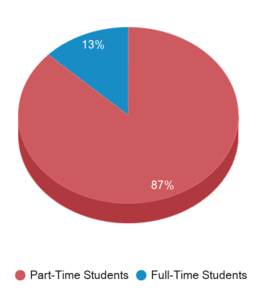
# Enrollment Undergraduate
806 students
240 students
# Full-Time Undergraduate Students
915 students
1,155 students
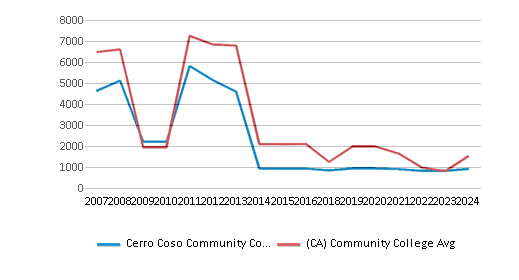
# Full-Time Graduate Students
n/a
63 students
# Part-Time Undergraduate Students
7,148 students
8,457 students
# Part-Time Graduate Students
n/a
10 students
Total Dormitory Capacity
n/a
140 students
% American Indian/Alaskan
2%
n/a
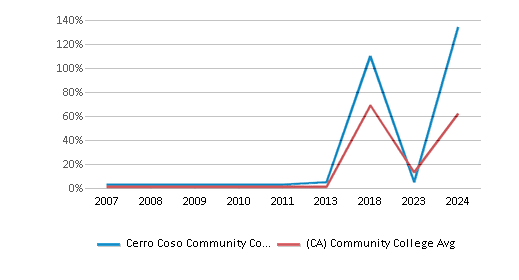
% Asian
4%
13%
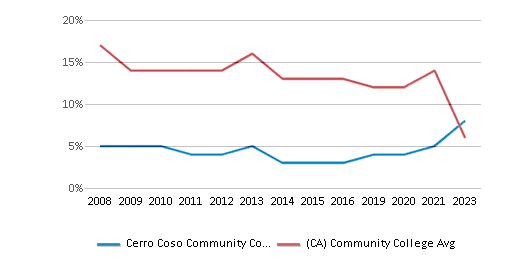
% Hispanic
47%
47%
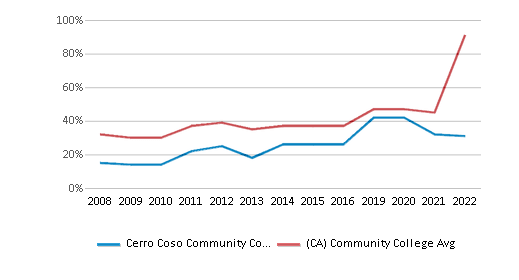
% Black
8%
7%
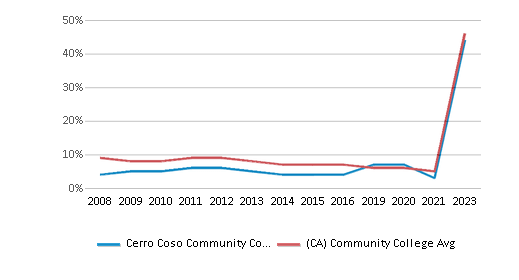
% White
33%
23%
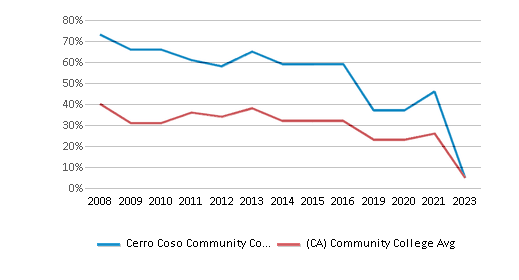
% Hawaiian
n/a
1%
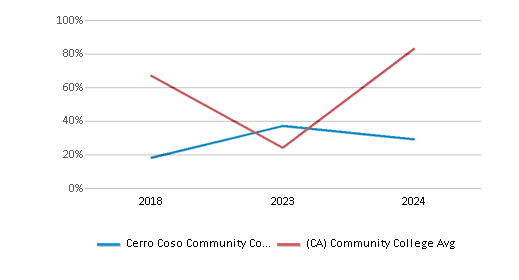
% Two or more races
5%
5%
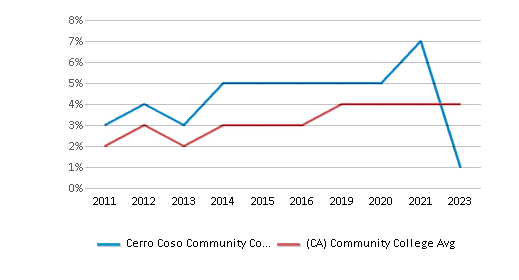
% Non Resident races
n/a
1%
% Unknown races
1%
3%
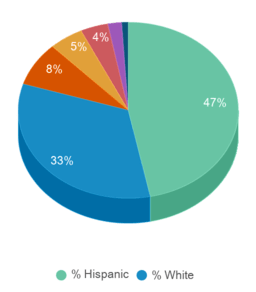
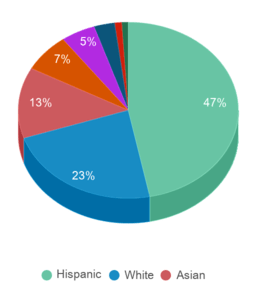
Diversity Score
0.66
0.70
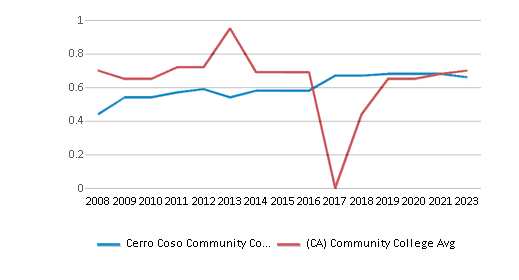
College Completion Rate (Students who graduate in less than 4 years)
0.2911%
0.4221%
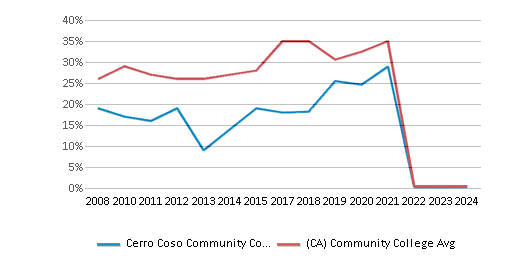
College Completion Rate (Students who graduate in 4 years or more than 4 years)
n/a
0.4304%
Average Graduate Earnings (10 Years)
$31,200
$34,700
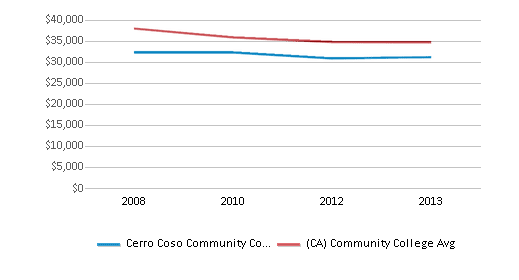
Tuition and Acceptance Rate
The public in-state tuition of $1,290 is more than the state average of $1,236. The in-state tuition has declined by 6% over four years.
The public out-state tuition of $7,086 is more than the state average of $6,547. The out-state tuition has declined by 28% over four years.
In-State Tuition Fees
$1,290
$1,236
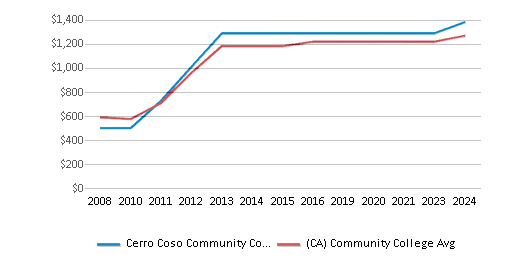
Out-State Tuition Fees
$7,086
$6,547
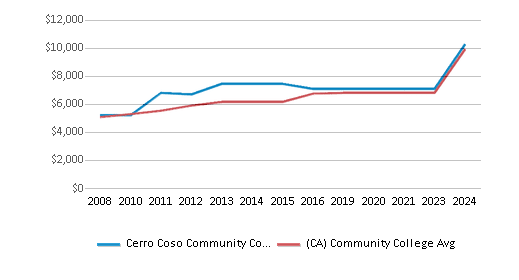
% Students Receiving Some Financial Aid
81%
85%
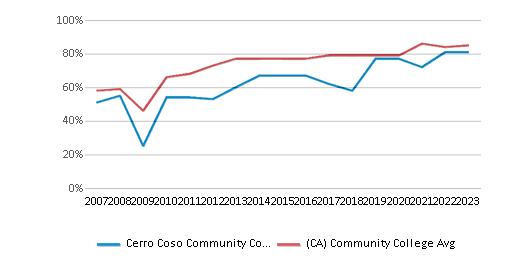
Median Debt for Graduates (Year 2008)
$6,787
$6,625
Median Debt for Dropouts
$3,500
$3,500
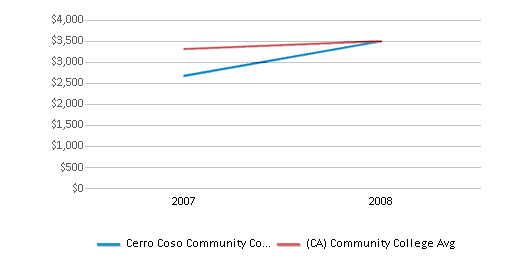
Acceptance Rate
n/a
92%
Source: 2024 (or latest year available) Integrated Postsecondary Education Data System (IPEDS) , School Administrators
School Notes
- Cerro Coso Community College was established in 1973 as a separate college within the Kern Community College District. Cerro Coso has five instructional sites (Eastern Sierra Center Bishop & Mammoth, Indian Wells Valley, Kern River Valley, and South Kern), which together form the largest geographical service area (18,000 square miles) of any community college in California and which serve a population of approximately 85,000. A leader in online education, Cerro Coso has been offering online classes since 1997 and offers 9 Associate's degrees entirely online and as many as 100+ classes online each year, with approximately 100 sections per semester. The 320-acre Indian Wells Valley Campus is located in the upper Mojave Desert in the community of Ridgecrest, with a population of 28,000. Ridgecrest is located 130 miles northeast of Los Angeles and 120 miles east of Bakersfield. Cerro Coso Community College is accredited by the Accrediting Commission for Community and Junior Colleges, Western Association of Schools and Colleges. The college and its programs are also approved by the California Community College Board of Governors, the California Board of Licensed Vocational Nurse and Psychiatric Examiners, and the California Department of Education for the enrollment of veterans. The University of California and other universities and colleges give full credit to appropriate lower division courses completed at Cerro Coso Community College. CCOnline, Cerro Coso Community College's virtual campus, currently offers associate degrees online, the general education courses necessary to meet transfer requirements to a four year institution, and student support services. CCOnline has an international reputation for excellence and provides an extraordinary opportunity for those too distant from a community college or too involved in business or family to pursue higher education during traditional hours.
Frequently Asked Questions
How much does Cerro Coso Community College cost?
Cerro Coso Community College's tuition is approximately $1,290 for In-State students and $7,086 for Out-State students.
Recent Articles

Obtaining Your Bachelor's Degree at a Community College
Explore the evolving landscape of community colleges offering bachelor's degrees, addressing affordability, accessibility, and workforce needs.

A to Z of Community College Certificates and Courses
From business and healthcare to technology and skilled trades, the article showcases the breadth of options available to students seeking to enhance their knowledge, develop new skills, or pursue career advancement.

What is a Community College?
This comprehensive guide explains what a community college is, its history, and its role in higher education. It covers the types of programs offered, differences from four-year colleges, benefits of attending, and important considerations for prospective students, providing valuable insights for those exploring educational options.









